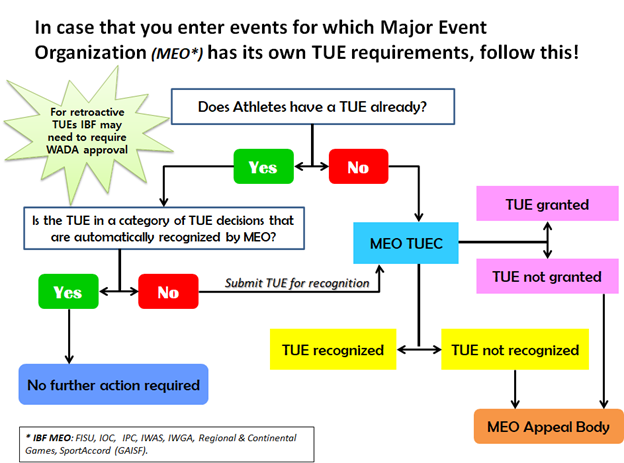A TUE is a certificate granted by an anti-doping organization (IF for international-level athletes, NADO for national-level athletes and MEO for athletes participating in an MEO event). The certificate is for a set prohibited substance, in certain dosages, with a limited period of validity. An application for a TUE must be based on a documented medical condition and diagnosis and the TUE will only be granted under strict criteria laid out in the International Standard of TUEs.
Athletes must absolutely avoid taking a medication with a prohibited substance without a valid TUE.
The presence of a prohibited substance or its metabolites or markers in an athlete’s sample without a valid TUE is an Anti-Doping Rule Violation (ADRV), as are the use or attempted use of a prohibited substance or a prohibited method, possession, administration or attempted administration.
Athletes must therefore consult the Prohibited List with their prescribing physician before taking a medication to ensure that no prohibited substance is contained in the medication needed.
An International-Level Athlete whose illness or condition requires treatment with a prohibited substance or method must apply to the IBF for a TUE following the IBF’s strict TUE application procedure
The following Athletes shall be considered to be International-Level Athletes for purposes of IBF Anti-Doping Rules, and therefore the specific provisions in IBF Anti-Doping Rules applicable to International-Level Athletes (as regards Testing but also as regards TUEs, whereabouts information, results management, and appeals) shall apply to such Athletes:
- Athletes that compete in Events organized by the IBF or where the IBF is the ruling body;
- All Athletes in the IBF Testing Pool.
TUE Application form
Each TUE application will be carefully evaluated by the IBF’s Therapeutic Use Exemption Committee and will only be granted in accordance with the International Standard for TUEs and the criteria laid out in article 4 of this standard.
If the TUE is granted, the athlete will then be permitted to use the medication during the period of validity of the TUE without committing an Anti-Doping Rules Violation (ADRV).
Regardless of whether a TUE has been granted or not, athletes should always declare on the doping control forms filled out during sample collection any medications and supplements taken within the seven days prior to sample collection, and any blood transfusions in the three months prior for blood samples.
WADA’s role in the TUE process is two-fold. First, the Agency, through its TUEC, has the right to monitor and review any TUE granted by an ADO and, following such review, to reverse any decision. Second, an athlete who submits a TUE application to an ADO (IF or NADO) and is denied a TUE, can ask WADA to review the decision. If WADA determines that denial of the TUE did not comply with the ISTUE, the Agency can reverse the decision. WADA itself does not accept TUE applications from athletes.
Athletes are responsible to renew their TUEs before the expiration date
National-Level Athletes are to apply to their National Anti-Doping Organizations (NADO) for a TUE
TUE application procedure (for International Level Athletes*)
- Download the TUE form from the IBF website
- Complete your personal details and ask your doctor/specialist to complete the medication and case history details.
∙ Your doctor/specialist will also need to attach supporting medical evidence to your application. (eg. Test results, extracts from notes, etc.)
- Submit the completed form to IBF (jinwoo@bowling.sport) at least 30 days before your competition.
∙ In emergency situation, it may be possible for a TUE to be granted in less than 30 days.
※ Athletes have right to appeal (within 21 days after the decision to CAS)
* International Level Athletes
- Athletes that compete in Events organized by the IBF or where the IBF is the ruling body;
- All Athletes in the IBF Registered Testing Pool and Testing Pool.















